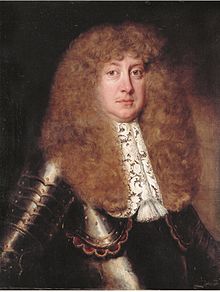Ernest Augustus, Elector of Hanover
| Ernest Augustus | |
|---|---|
| Duke of Brunswick-Lüneburg Elector-designate of Hanover | |
 Ernest Augustus, Duke of Brunswick-Lüneburg | |
| Elector of Hanover | |
| Reign | 19 December 1692 – 23 January 1698 |
| Successor | Georg Ludwig |
| Prince of Calenberg Duke of Brunswick-Lüneburg | |
| Reign | 18 December 1679 – 23 January 1698 |
| Predecessor | John Frederick |
| Successor | Georg Ludwig |
| Born | 20 November 1629 Herzberg am Harz |
| Died | 23 January 1698 (aged 68) Herrenhausen |
| Spouse | Sophia of the Palatinate |
| Issue | George I of Great Britain Friedrich Augustus Maximilian Wilhelm Sophia Charlotte, Queen in Prussia Karl Philipp Christian Heinrich Ernest Augustus, Duke of York |
| House | Hanover |
| Father | George, Duke of Brunswick-Lüneburg |
| Mother | Anne Eleonore of Hesse-Darmstadt |
Ernest Augustus (German: Ernst August; 20 November 1629 – 23 January 1698) was duke of Brunswick-Lüneburg and ruled over the Principality of Calenberg (with its capital Hanover) subdivision of the duchy. He was appointed prince-elector, but died before the appointment became effective. He was also Administrator of the Prince-Bishopric of Osnabrück.
Biography
Ernest Augustus was born at Herzberg am Harz, the son of George, Duke of Brunswick-Lüneburg and Anne Eleonore of Hesse-Darmstadt (Ernest Augustus was descended from the Albertinian line of the Habsburg family and also the House of Hohenzollern). In 1658 he married Sophia of the Palatinate in Heidelberg. As the fourth son, he had little chance of succeeding his father as ruler, and so, in 1662, his relatives appointed him administrator of Osnabrück; according to the Peace of Westphalia, every second incumbent of the Osnabrück see was to be appointed by the dukes of Brunswick-Lüneburg. However, after two of his elder brothers had died without sons, Ernest Augustus inherited part of his father's territories in 1679, namely Calenberg (including Göttingen).
In 1683, against the protestations of his five younger sons, Ernest Augustus instituted primogeniture, so that his territory would not be further subdivided after his death, and also as a pre-condition for obtaining the coveted electorship. He participated in the Great Turkish War on the side of Leopold I, Holy Roman Emperor. In 1692 he was appointed prince-elector by the Emperor; however, the electorship did not come into effect until 1708. Ernest Augustus died in 1698 at Herrenhausen; he was succeeded as duke by his eldest son George I Louis, who would later also become king of Great Britain.
Ancestry
Children
| Name | Birth | Death | Notes |
|---|---|---|---|
| George Louis | 28 May 1660 | 11 June 1727 | Succeeded his mother Sophia as heir presumptive to the throne of Great Britain and succeeded Queen Anne as King George I of Great Britain |
| Friedrich Augustus | 3 August 1661 | 31 December 1690 | Died at the Battle of St. Georgen |
| Stillborn son | February 1664 | February 1664 | |
| Maximilian Wilhelm | 13 December 1666 | 16 July 1726 | |
| Stillborn son | 13 December 1666 | 13 December 1666 | Twin of Maximilian |
| Sophia Charlotte | 30 October 1668 | 21 January 1705 | Married King Frederick I of Prussia |
| Karl Philipp | 3 October 1669 | 31 December 1690 | Died at the Battle of Pristina |
| Christian Heinrich | 19 September 1671 | 31 July 1703 | Died during the Battle of Munderkingen when drowned in the Danube |
| Ernest Augustus | 7 September 1674 | 14 August 1728 | Duke of York and Albany |




